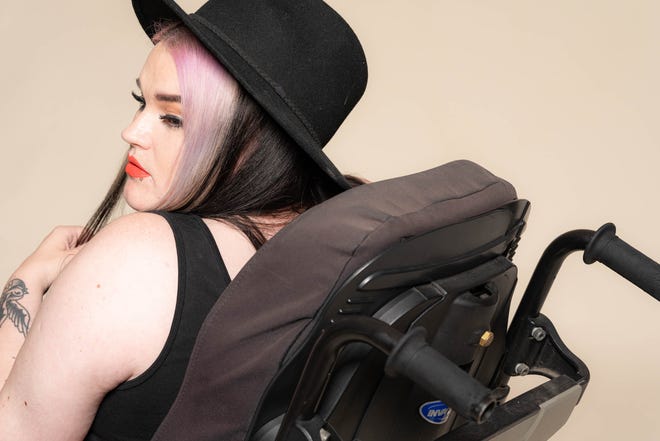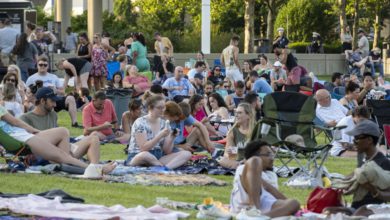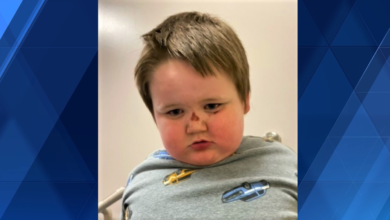
When Kelly Gordon was 18 years old, she was having sex on the floor of a car with a person she didn't particularly know. This might not sound especially risky, but somewhere in the middle of it, Gordon thought to herself, "what if he just left me here?" which was a terrifying prospect since Gordon can't use her legs.
"We were in a remote location. What would I have done? I can look back on it now and I'm horrified to think that I ever was in that headspace. ... My phone wasn't near me. It was probably in the car somewhere but not within reach since I was on the floor and unable to move," she said. "I was putting a lot of trust in someone I didn't know."
Gordon has spinal muscular atrophy type three, a progressive condition in which she loses ability throughout her life. Any changes to the body – growth, puberty, pregnancy – accelerate the loss. In Gordon's youth, she engaged in risky sexual behaviors in an effort to explore a sexuality that society denies she possesses. She met people she barely knew in places that were often unsafe to sate a desire no one believed could belong to a girl in a wheelchair.

"Disability and sex are seldom mentioned in the same sentence," she said. "As a disabled person you can often be viewed as asexual and completely left out of the conversation when it comes to sex and intimacy."
People living with disabilities are frequently denied fundamental elements of well-being – visibility, agency, dignity. The cultural denial of their sexuality, disability activists say, is another feature of their dehumanization. Many people living with disabilities masturbate, experience sexual attraction and engage in sexual activity. But these facts do not align with stereotypes of disabled people that those living without disabilities confuse for reality.
"For nondisabled people, the idea of disabled people having sex doesn’t fit with their mental model of how they understand disabled people. We are perpetually infantilized so there’s that conundrum. They also largely don’t see us as lovers, parents, partners, one-night stands," said Kara Ayers, associate director of the University of Cincinnati Center for Excellence in Developmental Disabilities. "Superficial ideals and misogyny also play a role here in people being fairly inflexible with what (or) who they consider sexually attractive."
'I felt like ... I'm not attractive because of my disability'
Early in her life, when she could still walk, Gordon had "boyfriends" in the way children do. But by the time she was 12, she was in an electric wheelchair most of the time. People didn't pursue her, they avoided her. At 14, like most adolescents, she had the urge to explore her burgeoning sexuality but quickly learned her disability complicated not only how others saw her but also how she saw herself.
'Sex drive':Have we been thinking about it all wrong?
"I had those feelings where I felt like, 'Wow, I'm not attractive because of my disability,'" she said. "I went on a journey where I was putting myself out there ... to make myself seem like a sexual person from the off. So they'd know, 'OK, this person's interested in sex.'"
For Gordon that meant more elaborate makeup, more explicit sexual conversations and an expressed interest in casual hook-ups.
"I'd meet people online, people from out of school, not really disclosing my disability until either the last minute or sometimes not at all, because I was genuinely scared," she said. "People made me feel like I wasn't sexually attractive or good enough. I had a belief deep in me then that nobody would date me because I was disabled."
Lack of understanding about disability and sex has harmful consequences
Approximately 15% of the world's population experience some form of disability, and there's a long history of denying them sexual agency and reproductive rights.
Some of the biggest myths about disabled people are that they don't want or value pleasure, that they don't have sex or one-night stands, and that they only date other disabled people.
"Society objectifies and dehumanizes people with disabilities," said Ayers, who has Osteogenesis Imperfecta. "We don't think that a disabled person has the same desires, wants, needs."
These misbeliefs have harmful consequences. People with disabilities are often not seen as sexually desirable, children with disabilities learn less about sex than their non-disabled peers and there's a dearth of research on the sexual health of people with disabilities.
Some people with disabilities require caregivers, many of whom are uncomfortable assisting with sexual needs, whether that's helping someone get onto a bed to engage in sexual activity with a partner or purchasing a sex toy.
A 2011 paper in the Canadian Medical Association Journal found "the sexuality of people with disabilities, many of whom require varying degrees of assistance to lead fulfilling sex lives, continues to be overlooked, avoided or even dismissed as a component of holistic care."
There's also a myth that people with disabilities don't want or can't have children. Ayers said many people with disabilities want families, but their choices are often curtailed.
According to the American Psychological Association, thousands of people living with disabilities in the last century were sterilized without their consent to keep them from reproducing. The legacy of reproductive violence continues today, said Ayers, who also says she sees parents of people with disabilities dictating their reproductive choices.
'I had to lose my virginity in a brothel'
Asta Philpot had sex for the first time in a brothel in Spain. It felt good, though he admits he would have preferred a less transactional entre into his sexual life. While most people's first sexual experience is awkward, he would have enjoyed less bumbling.
"The lady I was with couldn't speak a word of English, and just asking her to remove my seatbelt was like launching a NASA rocket," he said.
Philpot is an activist, a filmmaker, a romantic. He also has arthrogryposis, which impairs his movement. He needs assistance from the moment he opens his eyes until the moment he goes to bed. But Philpot feels less limited by his body than by a world that refuses to see the possibility it contains: to give and receive pleasure, to love and be loved.

"I had to lose my virginity in a brothel with a sex worker because everyone thought I was switched off below," he said. "Society looks at me as some kind of institutionalized being that has no sexual desire. ... We're in 2021 now, and I can't actually believe that we're still having to talk about the taboo of disability and sex."
Philpot's sexual experiences inspired a BBC documentary and two feature films, "Hasta La Vista" and the dramedy "Come as You Are." But while the films focused on sexual pursuit, it's no longer Philopt's dominant storyline. Finding sexual partners has been a challenge, but finding love has proven the most formidable one. Philpot, now on the eve of 40, wants sex, but also connection, intimacy, longevity. He wants someone who will accept his body, who doesn't see it as calamity and confinement.
'Am I actually going to meet someone?'
Gordon feared her disability made her undatable, but dates happened. Sex happened. What took more work was demanding the relationship she deserved. She needed to find acceptance outside the bedroom before she could ask for what she needed inside it.
Sexism diminishes female pleasure:What women need to know
Gordon, now 32 and married with two children, has a life tothat 15 years ago felt elusive.
Philpot is still looking for it.
"I'm 39 now and I'm single," he said. "I've often thought to myself, especially this year, 'Jesus, am I actually going to meet someone?'"
Nondisabled people, he said, don't appreciate how difficult it is for those living with disabilities to pursue physical and emotional intimacy. As a disabled man, Philpot said his fears of isolation are amplified. But his desires – for connection, purpose, bliss – are no different than someone who can move through the world autonomously.
"I'm looking for intimacy and someone to share my life with, and to see me as Asta, and not as a person with a disability in a wheelchair. It's something that we all long for, someone to love and who will love us back," he said. "It wasn't my fault that I was born this way, but this is what I've got. I'm happy in my own skin, and I'd just like to attract someone who sees me for who I am. That's all I want."
You may also be interested in:
Source link








